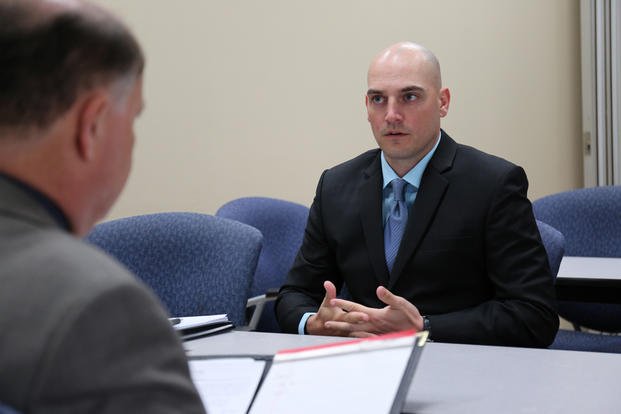A job interview is your chance to shine to employers. When you interview with a civilian company, you must be able to explain what you know about the company, the open position and why you're the best for the job and their office. But employers can spot an unprepared candidate a mile away, and you don't want to let your lack of readiness to be your downfall.
If you're unsure of what to research or bring to your first interview, use this list of interview resources the Bureau of Labor Statistics developed to whip you into interview-ready shape.
Before the Interview
Learn about the organization.
Don't just Google the company; try to look at Better Business Bureau (BBB) ratings or Yelp reviews that rate your potential employer's customer service record.
Review your qualifications for the job.
Try to match your skills as close to the requirements as possible. Employers want to know that your skills are a direct fit for the position.
Explain how your military experience would relate to the job.
Use Military.com's Skills Translator to help you articulate how your military occupational specialty (MOS) can be applied in this civilian job.
Prepare for questions.
The most common ones are, "Why should I hire you?" and, "Why do you want this job?"
Practice interviewing.
Ask a friend or family member to help you with a mock interview.
Refining Your Look
Be well-groomed.
Avoid dousing yourself in cologne or perfume, and ensure that you're clean-shaven and have a fresh haircut.
Dress appropriately.
If you can, buy an updated interview suit. Check out our slideshow for how to dress for the interview.
Don't smoke before the interview.
You don't want to distract the interviewer with the stench of cigarettes.
The Day of the Interview
What items to bring
You should bring the following items -- your Social Security card, government-issued ID (such as a driver's license), at least five copies of your resume and three or more written references.
Be early.
Arrive about five minutes early. If you get there too early, say 15 to 30 minutes ahead of schedule, you could seem like you're rushing your interviewer.
Learn the name of your interviewer.
Greet them with a firm (but not bone-crushing) handshake.
Be polite.
Be as courteous and professional with everyone you meet.
Don't use slang.
Or worse, don't curse during your interview, even in jest.
Maintain eye contact and don't slouch.
This doesn't mean that you stare a hole in your interviewer, but maintain eye contact when you're speaking to them and be sure to sit up straight. It shows self-confidence and professionalism.
Don't be afraid to ask questions about the job.
Also, ask questions about the company and your potential boss. However, don't ask questions that you know the answers to. For example, don't ask any questions that can be found on the company website.
After the Interview
Send a thank-you note.
You can send a thank-you email or handwritten letter to your interviewer. Be sure to thank them for taking the time to interview you and reinforce why this is a good fit for you and the potential employer.
Find the Right Veteran Job
Whether you want to polish your resume, find veteran job fairs in your area or connect with employers looking to hire veterans, Military.com can help. Subscribe to Military.com to have job postings, guides and advice, and more delivered directly to your inbox.











